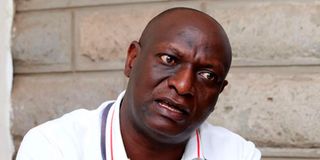Charles Keter: I do not own tea harvesting machines

Former Devolution Cabinet Secretary Charles Keter during a past interview.
Former Devolution Cabinet Secretary Charles Keter has denied owning the tea harvesting machines that have been at the centre of controversy in the South Rift.
Mr Keter’s opponents in the governorship race have blamed him for the use of the machines that have cost many tea pickers jobs on multinational tea farms.
On Tuesday, Mr Keter, one of the front-runners in the race to succeed Kericho Governor Paul Chepkwony, broke his silence, saying he does not own a single tea harvesting machine.
"I don't own any tea picking machines nor have I ever done business with the tea companies in that regard," he said.
Mr Keter's main challenger, Dr Erick Mutai, has been riding on a pledge that if elected, his administration would compel multinational tea firms to drop the use of tea harvesters.
"If elected governor, my administration will do away with the tea plucking machines owned by Kericho tycoons and rehire the tea pickers the firms had fired and replaced with the machines. It is the main cause of unemployment in Kericho and the death of the local economy," Dr Mutai said.
Mr Keter challenged his accusers to show evidence that he owns tea harvesting machines or keep quiet.
"Those seeking elective office should come up with an agenda for the people of Kericho instead of resorting to lies and misinformation," he said.
In fending off his accusers, the former MP for Belgut produced a 2003 Hansard report in which he raised concerns about tea mechanisation on the floor of the National Assembly.
He had sought to know how many tea harvesting machines James Finlay and Unilever (now CVC Capital Partners) had imported and where the machines were located in the tea estates.
Mr Keter also asked the then Agriculture assistant minister James Kembi Gitura the ratio of one machine to human labour, and an assurance that no tea pickers would be laid off as a result of the machines.
Hansard report
In his response, Mr Gitura said that James Finlay had then imported 52 plucking machines and Unilever 15.
According to the Hansard report, the ratio of one machine to workers in the case of James Finlay was 1:7 and 1:15 for Unilever.
Multinational tea companies, led by James Finlay, revealed last year before the Senate's Labour and Social Welfare Committee, chaired by Nairobi Senator Johnson Sakaja, that the firm had fully mechanised its tea harvesting.
This has led the United Kingdom-based tea company, which once employed 12,000 people in the era of hand plucking, to downsize its workforce to 5,000.
The move, according to the Kericho Chamber of Commerce, had led to joblessness and dealt a blow to the local economy.
The tea firms have been a recurrent subject in the campaign period, with politicians using it to appeal to the emotions of local voters.
In the last two general elections, Governor Chepkwony rose and maintained power by convincing members of the Kipsisgis and Talai clans that he would fight the British government to pay them compensation for historical injustices, including the forceful acquisition of land to establish the expansive tea farms.
Pending at the United Nations Human Rights Council is s Sh2 trillion compensation suit filed by 115,000 members of the Kipsigis and Talai clan over their eviction from 800,000 acres by the British colonial government to pave the way for the tea plantation that straddles Kericho and Bomet counties.
The land is now occupied by multinational tea firms under a 99-year lease.





